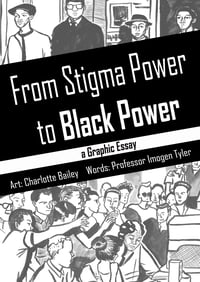From Stigma Power to Black Power: a Graphic Essay
In this unique graphic essay, sociologist professor Imogen Tyler & artist Charlotte M L Bailey transform our understanding of what stigma is and highlights the ways in which stigma power is fiercely and collectively resisted from below.
*
40 pages
A4 perfect bond book with a nice matt cover
Black & White (with Ink & Brush illustrations)
Published by the creators in 2019 - You will be supporting the artist directly with your purchase.
Preview this item at www.charlottewithink.com
*
Travelling from the Northern to the Southern states in 1960 meant crossing, in Erving Goffman's terms, from one "social interaction order" into another.
It meant immersion in the social politics of white supremacy, manifest in the Jim Crow signs that segregated social spaces, and the unspoken rules, rituals and codes "designed to degrade and divide" (Angela Davis, 1970).
By 1963, 'the southern struggle had grown from a modest group of Black
students demonstrating at one lunch counter to the largest mass
movement for racial reform and civil rights in the 20th century’
(Gary Younge, 2013).
It was in the midst of these political struggles in ‘the interaction order’
that Goffman crafted his concept of stigma.
"Normals", Goffman reassures the stigmatised reader, "really mean no harm, and should therefore be tactfully helped to act nicely".
In effect, by arguing for the management of stigma, that is for it's pacification, Goffman normalises stigma and conceals 'its violent underpinnings and periodic atrocities'.
This critical reading of Goffman is an urgent one in the context of a wider movement to "decolonise" the sociological canon. With this in mind, this essay rethinks stigma as a technology of racism.
*
"From Stigma Power to Black Power" is a graphic essay written by Sociology Professor Imogen Tyler & illustrated by Birmingham UK based artist Charlotte M L Bailey.
The aim of the original article was to expose some of the limitations of the American sociologist Erving Goffman's influential account of stigma (published in his book ‘Stigma’ in 1963).
It argues that placing Goffman's account of stigma into dialogue with Civil Rights and anti-racist activism from the 1960s, and foregrounding racism as a preeminent form of social stigmatisation, transforms our understanding of what stigma is and what the social and political purpose of stigmatisation might be in particular contexts.
*
you can see a preview at www.charlottewithink.com
email [email protected] if you have any questions or for bulk orders
